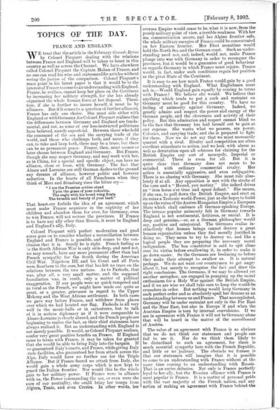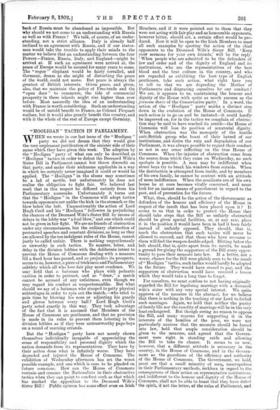TOPICS OF THE DAY.
FRANCE AND ENGLAND.
WE trust that the article in the February Grande Rscue by Colonel Picquart dealing with the relations between France and England will be taken to heart in this country as well as across the Channel. We have elsewhere called Colonel Picquart the Captain Mahan of France, and no one can read his wise and statesmanlike articles without seeing the justice of the comparison. Colonel Picquart's main point in his latest paper is that it would be to the interest of France to come to an understanding with England. France, he realises, cannot keep her place on the Continent by increasing her military strength, for she has already organised the whole human force at her disposal. There- fore, if she is further to insure herself, it must be by alliances. But if it comes to a question of further alliances, France has only one choice. She must side either with England or with Germany, forColonel Picquart realises that the differences between Germany and England are funda- mental, and not, as some of our less-instructed politicians have believed, merely superficial. Between those who hold the command of the sea and the carrying trade of the world, and those who challenge both, and mean, if they can, to take and keep both, there may be a truce, but there can be no permanent peace. France, then, must sooner or later choose between England and Germany But France, though she may respect Germany, and may work with her, as in China, for a special and specific object, can have no alliance, close or loose, with Germany. The fact that Alsace and Lorraine are still German dashes to the ground any dreams of alliance, however politic and however seductive. In the hearts of all Frenchmen when they think of Metz and Strasburg rises the bitter cry- " I see the Prussian soldier stand
Upon the grass of your redoubts. The eagle with his broad wing flouts The breadth and beauty of your land."
That heart-cry forbids the idea of an agreement, which must make France acquiesce in the captivity of her Children and abandon them for ever, for Germany, even to win France, will not restore the provinces. If -France is to have any ally other than Russia, it must be England and England's ally, Italy.
Colonel Picquart with perfect moderation and good sense goes on to consider whether a reconciliation between England and France is possible, and comes to the con- clusion that it is. Surely he is right. French feeling as o i the South African War s only skin-deep, and need not, we may remark, have any more permanent effect than had French sympathy for the South during the American Civil War. Napoleon III. and his Court and all Paris were Southern to the core, but that has left no trace on the relations between the two nations. As to Fashoda, that was, after all, a very small matter, and the supposed humiliation was, in truth, only a matter of political exaggeration. ' If our people were as quick-tempered and as vocal as the French, we might have made out quite as great, or a greater, grievance in regard to the Upper Mekong and the West African settlement. In both cases we gave way before France, and withdrew from places over which we had hoisted our flag. Fashoda is all very well in the music-halls or in caricatures, but to talk of it in serious diplomacy as if it were comparable to Alsace-Lorraine is clearly absurd, and the French people are beginning to realise the fact, as their chief statesmen have always realised it. But an understanding with England is not merely possible. It would, as Colonel Picquart realises, confer very great positive benefits on France. If England came to terms with France, it may be taken for granted that she would be able to bring Italy into the bargain. If -s-e guaranteed Italy's coasts, and France, while giving Italy :rade facilities, also guaranteed her from attack across the Alps, Italy would have no further use for the Triple Alliance. But if France feared no attack from Italy, she would gain a Whole army corps which is now kept to guard the Italian frontier. Nor would this be the whole gain to her military power. If France were in alliance with us, the Power commanding the sea, or even were she . sum of our neutrality; she could bring her troops from Algiers, Timis, and even Corsica. In other words, her oversee Empire would cease to be, what it is now, from the purely military point of view, a terrible weakness. With her sea communication secure, and her Alpine frontier safe, the whole military energies of Franco could be concentrated on her Eastern frontier. Her Fleet meantime would hold the North Sea and the German coast. Such an under- standing need not, and, indeed, would not, make France plunge into war with Germany in order to reconquer the provinces, but it would be a guarantee of good. behaviour as regards Germany in which France must rejoice. France would, in fact, under such conditions regain her positioh as the pivot State of the Continent.
It is easy to see how much Frahm would gain by a good understanding with England. What Englishmen must ask is,—Would England gain equally by coming to terms with France ? We believe she would. We believe that anything which tends to put a curb and restraint on Germany must be good. for this country. We have no feeling of animosity against Germany. Indeed, we greatly admire and respect the power and energy of the German people, and the cleverness and activity of their policy. But this admiration and respect cannot blind us to the fact that Germany has laid herself out to gain at our expense. She wants what we possess, sea power, Colonies, and carrying trade, and she is prepared to fight for them. Now we do not say that we must necessarily quarrel with a rival. Rivalry and competition are often excellent stimulants to action, and we look with alarm as well as detestation upon all schemes for claiming for the British Empire any sort of monopoly, Imperial or commercial. There is room for all. But it is quite clear that Germany does not mean to be satisfied with ordinary commercial rivalry. Her action is essentially aggressive, and even subjugative. There is no sharing with Germany She must rule abso- lutely if at all. Any opposition is met with the stroke of the cane and a "Hound, you mutiny." She indeed drives an "iron horse o'er time and space defiant." She means, if she can, to pull down the British Empire, and erect on its ruins a Teutonic world-Power, just as she hopes to build up on the ruins of theAustro-Hungarian Empire a European State which shall embrace all German-speaking Europe. The intense popular animosity felt in Germany towards England is not sentimental, fictitious, or unreal. It is deep and genuine,—or, as a German philosopher would say, positive and categorical. The Germans realise in- stinctively that human beings cannot destroy a great human organisation unless they feel morally justified in doing so. They mean to try to destroy us, and like a logical people they are preparing the necessary moral indignation. The boa, constrictor is said to spit slime over its victim before swallowing it, in order to make it go down easier. So the Germans are besliming us before they make their attempt to swallow us. It is natural perhaps. We do not want our countrymen to get angry about it, but merely to recognise the fact and draw the right conclusions. The Germans, if we may be allowed yet another metaphor, are engaged in pumping up the moral enthusiasm for a Holy War against the British Empire, and if we are wise we shall take care to keep the would-be crusaders in order. But nothing would. keep Germany in such perfect order and so absolutely spoil her dreams as an understanding between us and France. That accomplished, Germany will be under restraint not only in the Far East and the Near East, but also in Europe if and when the Austrian Empire is torn by internal convulsions. If we are in agreement with France it will not be Germany alone that will be heard in the matter of the morcellement of Austria.
The value of an agreement with France is so obvious that we do not think our • statesmen and people can fail to see it. Nor do we think them likely to be disinclined to such an agreement, for there is much essential sympathy here with the French Republic, and. little or no jealousy. The obstacle we foresee is that our statesmen will imagine that it is possible to come to an understanding with France without at the same time coming to an understanding with Russia. That is an entire delusion. Not only is France perfectly loyal to her ally, but the Russian alliance with France is most popular in France. It is a matter of personal pride with the vast majority of the French nation, and any notion of making an agreement with France behind the back of Russia must be abandoned as impossible. But why should we not come to an understanding with Russia as well as with France ? We talk, of course, of an under- standing, not a strict alliance. Italy is already half inclined to an agreement with Russia, and if our states- men would take the trouble to apply their minds to the matter we believe that an understanding between the four Powers—France, Russia, Italy, and England—might be arrived at. If such an agreement were arrived at, the peace of Europe would be secured for many years to come. The " rogue " elephant would be fairly corralled, and Germany, dream as she might of disturbing the peace of the world, could. not move. But peace is always the greatest of British interests. Given peace, and given, also, that we maintain the policy of Free-trade and the "open door" to commerce, the tide of commercial prosperity in these islands might rise higher than ever before. Most assuredly the idea of an understanding with France is worth considering. Such an understanding would be of untold benefit to France, as Colonel Picquart realises, but it would also greatly benefit this country, and. with it the whole of the rest of Europe except Germany.











































 Previous page
Previous page